BMP6001: COVID-19 Impact on Consumer Behavior in Online Buying
VerifiedAdded on 2023/06/17
|15
|2959
|51
Project
AI Summary
This research project proposal aims to analyze the impact of the COVID-19 pandemic on online buying behavior, focusing on the drivers for e-buying, preferred products purchased online, and the overall growth of online businesses during the pandemic. The proposal outlines research questions, aims, and objectives, supported by literature from various sources that highlight the increased internet utilization, shift to online shopping due to safety concerns, and the opportunities for e-commerce growth during quarantine. The research methodology employs Saunders' research onion framework, utilizing an epistemology research philosophy, a deductive research approach, and a multi-method research strategy involving both quantitative and qualitative data collection through questionnaires and secondary sources. The proposal includes a Gantt chart outlining activities and timescales, a research ethics checklist, and references to relevant academic journals and books.

Research
Page 1 of 15
Page 1 of 15
Paraphrase This Document
Need a fresh take? Get an instant paraphrase of this document with our AI Paraphraser
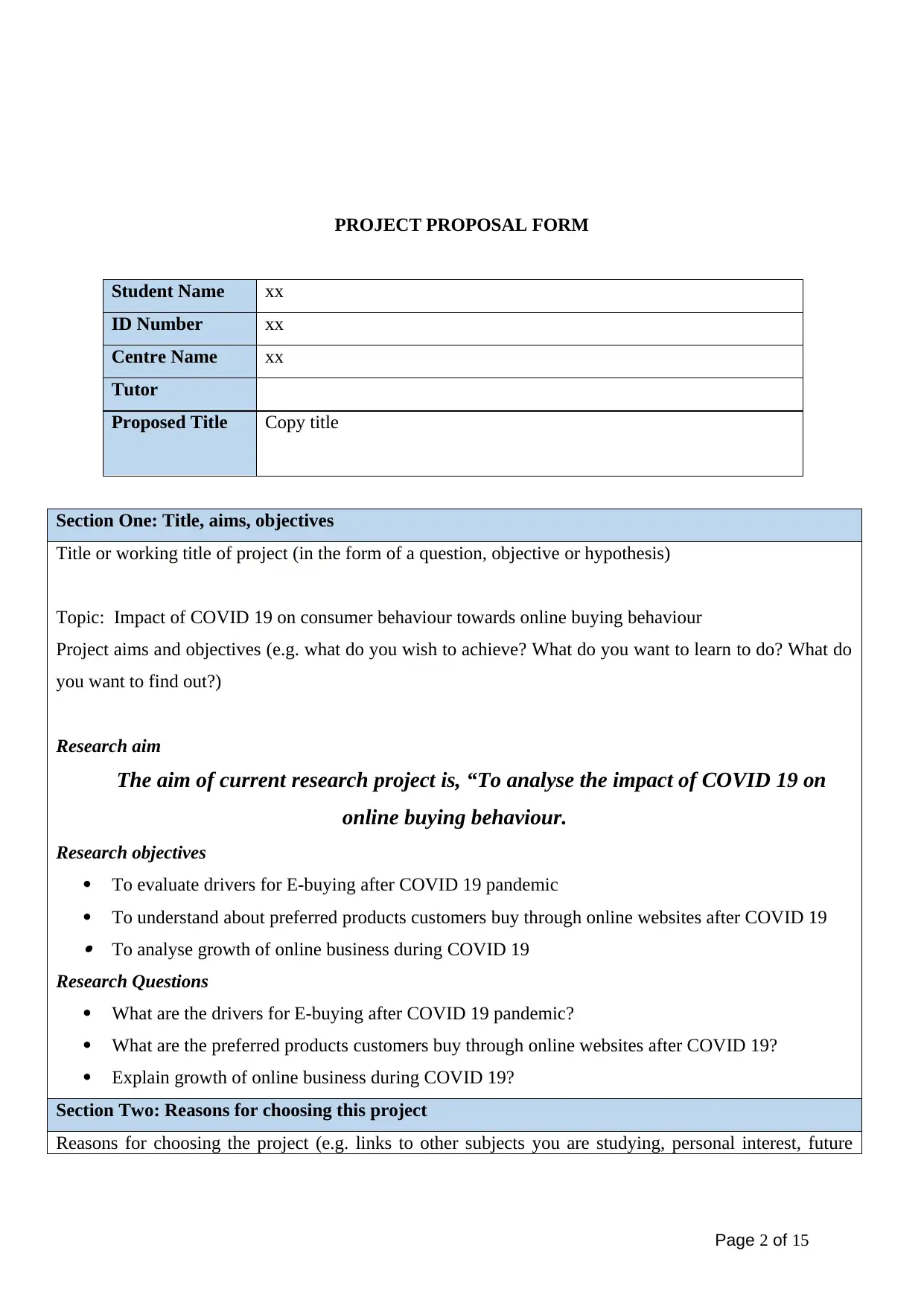
PROJECT PROPOSAL FORM
Student Name xx
ID Number xx
Centre Name xx
Tutor
Proposed Title Copy title
Section One: Title, aims, objectives
Title or working title of project (in the form of a question, objective or hypothesis)
Topic: Impact of COVID 19 on consumer behaviour towards online buying behaviour
Project aims and objectives (e.g. what do you wish to achieve? What do you want to learn to do? What do
you want to find out?)
Research aim
The aim of current research project is, “To analyse the impact of COVID 19 on
online buying behaviour.
Research objectives
To evaluate drivers for E-buying after COVID 19 pandemic
To understand about preferred products customers buy through online websites after COVID 19
To analyse growth of online business during COVID 19
Research Questions
What are the drivers for E-buying after COVID 19 pandemic?
What are the preferred products customers buy through online websites after COVID 19?
Explain growth of online business during COVID 19?
Section Two: Reasons for choosing this project
Reasons for choosing the project (e.g. links to other subjects you are studying, personal interest, future
Page 2 of 15
Student Name xx
ID Number xx
Centre Name xx
Tutor
Proposed Title Copy title
Section One: Title, aims, objectives
Title or working title of project (in the form of a question, objective or hypothesis)
Topic: Impact of COVID 19 on consumer behaviour towards online buying behaviour
Project aims and objectives (e.g. what do you wish to achieve? What do you want to learn to do? What do
you want to find out?)
Research aim
The aim of current research project is, “To analyse the impact of COVID 19 on
online buying behaviour.
Research objectives
To evaluate drivers for E-buying after COVID 19 pandemic
To understand about preferred products customers buy through online websites after COVID 19
To analyse growth of online business during COVID 19
Research Questions
What are the drivers for E-buying after COVID 19 pandemic?
What are the preferred products customers buy through online websites after COVID 19?
Explain growth of online business during COVID 19?
Section Two: Reasons for choosing this project
Reasons for choosing the project (e.g. links to other subjects you are studying, personal interest, future
Page 2 of 15
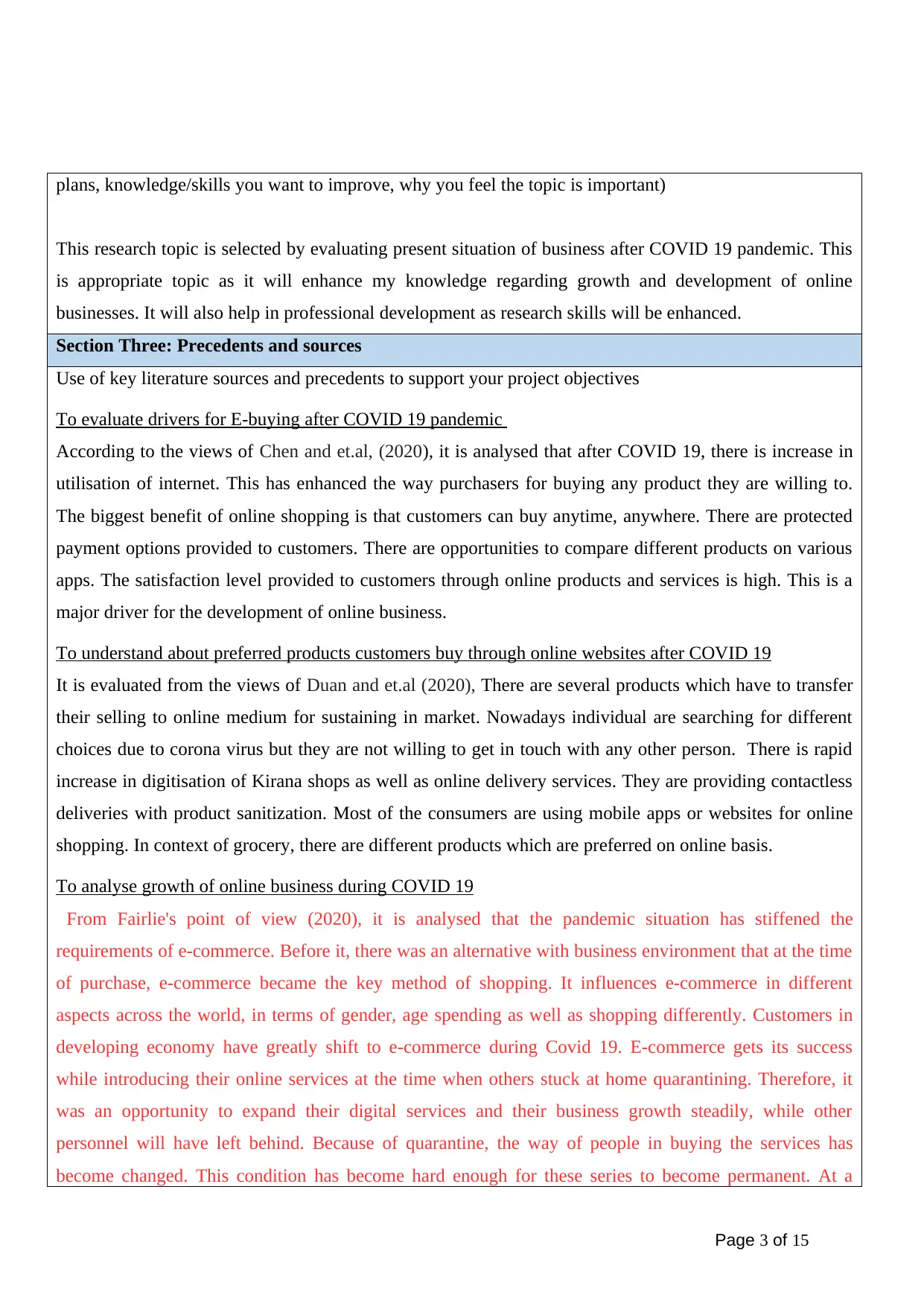
plans, knowledge/skills you want to improve, why you feel the topic is important)
This research topic is selected by evaluating present situation of business after COVID 19 pandemic. This
is appropriate topic as it will enhance my knowledge regarding growth and development of online
businesses. It will also help in professional development as research skills will be enhanced.
Section Three: Precedents and sources
Use of key literature sources and precedents to support your project objectives
To evaluate drivers for E-buying after COVID 19 pandemic
According to the views of Chen and et.al, (2020), it is analysed that after COVID 19, there is increase in
utilisation of internet. This has enhanced the way purchasers for buying any product they are willing to.
The biggest benefit of online shopping is that customers can buy anytime, anywhere. There are protected
payment options provided to customers. There are opportunities to compare different products on various
apps. The satisfaction level provided to customers through online products and services is high. This is a
major driver for the development of online business.
To understand about preferred products customers buy through online websites after COVID 19
It is evaluated from the views of Duan and et.al (2020), There are several products which have to transfer
their selling to online medium for sustaining in market. Nowadays individual are searching for different
choices due to corona virus but they are not willing to get in touch with any other person. There is rapid
increase in digitisation of Kirana shops as well as online delivery services. They are providing contactless
deliveries with product sanitization. Most of the consumers are using mobile apps or websites for online
shopping. In context of grocery, there are different products which are preferred on online basis.
To analyse growth of online business during COVID 19
From Fairlie's point of view (2020), it is analysed that the pandemic situation has stiffened the
requirements of e-commerce. Before it, there was an alternative with business environment that at the time
of purchase, e-commerce became the key method of shopping. It influences e-commerce in different
aspects across the world, in terms of gender, age spending as well as shopping differently. Customers in
developing economy have greatly shift to e-commerce during Covid 19. E-commerce gets its success
while introducing their online services at the time when others stuck at home quarantining. Therefore, it
was an opportunity to expand their digital services and their business growth steadily, while other
personnel will have left behind. Because of quarantine, the way of people in buying the services has
become changed. This condition has become hard enough for these series to become permanent. At a
Page 3 of 15
This research topic is selected by evaluating present situation of business after COVID 19 pandemic. This
is appropriate topic as it will enhance my knowledge regarding growth and development of online
businesses. It will also help in professional development as research skills will be enhanced.
Section Three: Precedents and sources
Use of key literature sources and precedents to support your project objectives
To evaluate drivers for E-buying after COVID 19 pandemic
According to the views of Chen and et.al, (2020), it is analysed that after COVID 19, there is increase in
utilisation of internet. This has enhanced the way purchasers for buying any product they are willing to.
The biggest benefit of online shopping is that customers can buy anytime, anywhere. There are protected
payment options provided to customers. There are opportunities to compare different products on various
apps. The satisfaction level provided to customers through online products and services is high. This is a
major driver for the development of online business.
To understand about preferred products customers buy through online websites after COVID 19
It is evaluated from the views of Duan and et.al (2020), There are several products which have to transfer
their selling to online medium for sustaining in market. Nowadays individual are searching for different
choices due to corona virus but they are not willing to get in touch with any other person. There is rapid
increase in digitisation of Kirana shops as well as online delivery services. They are providing contactless
deliveries with product sanitization. Most of the consumers are using mobile apps or websites for online
shopping. In context of grocery, there are different products which are preferred on online basis.
To analyse growth of online business during COVID 19
From Fairlie's point of view (2020), it is analysed that the pandemic situation has stiffened the
requirements of e-commerce. Before it, there was an alternative with business environment that at the time
of purchase, e-commerce became the key method of shopping. It influences e-commerce in different
aspects across the world, in terms of gender, age spending as well as shopping differently. Customers in
developing economy have greatly shift to e-commerce during Covid 19. E-commerce gets its success
while introducing their online services at the time when others stuck at home quarantining. Therefore, it
was an opportunity to expand their digital services and their business growth steadily, while other
personnel will have left behind. Because of quarantine, the way of people in buying the services has
become changed. This condition has become hard enough for these series to become permanent. At a
Page 3 of 15
⊘ This is a preview!⊘
Do you want full access?
Subscribe today to unlock all pages.

Trusted by 1+ million students worldwide
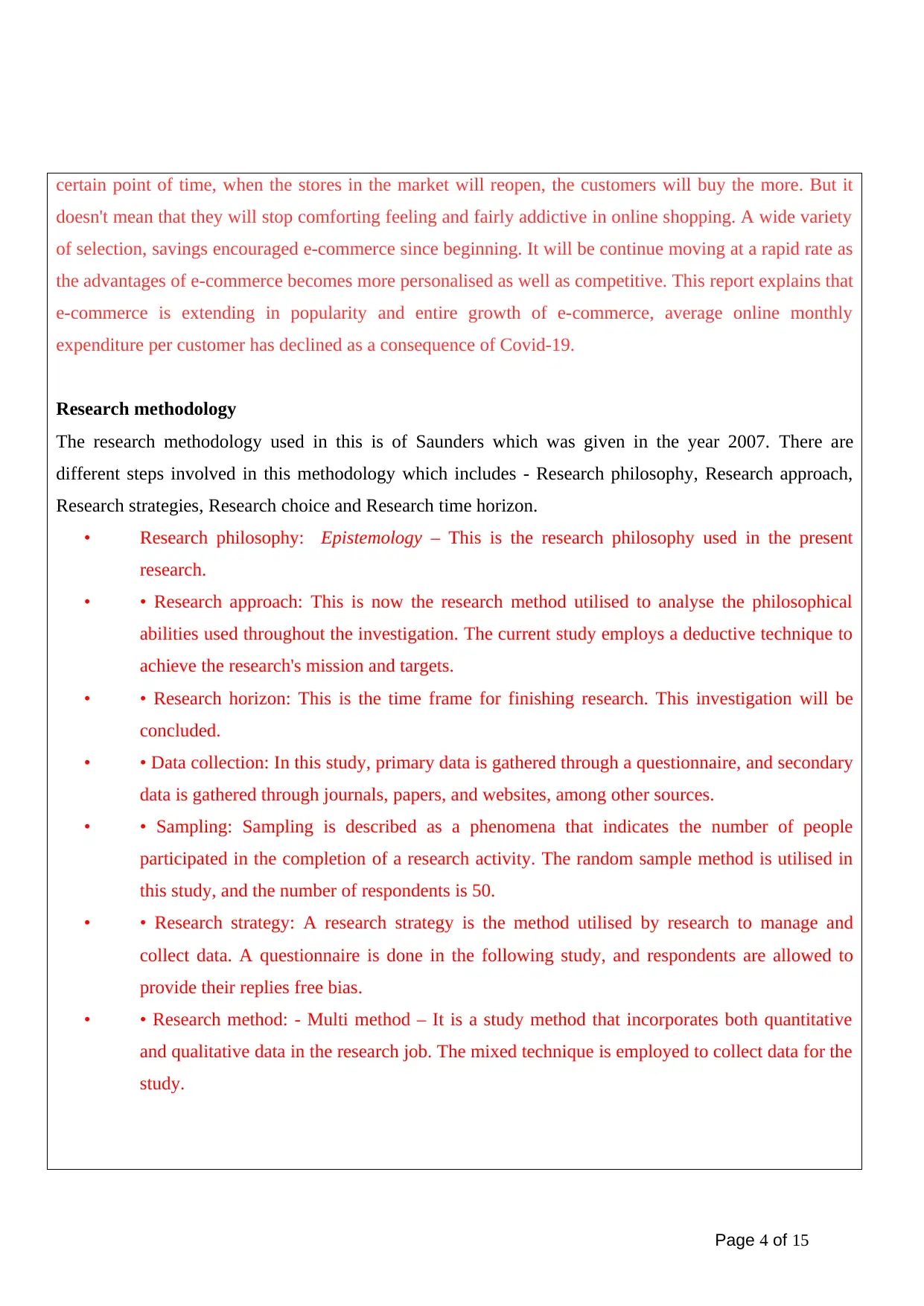
certain point of time, when the stores in the market will reopen, the customers will buy the more. But it
doesn't mean that they will stop comforting feeling and fairly addictive in online shopping. A wide variety
of selection, savings encouraged e-commerce since beginning. It will be continue moving at a rapid rate as
the advantages of e-commerce becomes more personalised as well as competitive. This report explains that
e-commerce is extending in popularity and entire growth of e-commerce, average online monthly
expenditure per customer has declined as a consequence of Covid-19.
Research methodology
The research methodology used in this is of Saunders which was given in the year 2007. There are
different steps involved in this methodology which includes - Research philosophy, Research approach,
Research strategies, Research choice and Research time horizon.
• Research philosophy: Epistemology – This is the research philosophy used in the present
research.
• • Research approach: This is now the research method utilised to analyse the philosophical
abilities used throughout the investigation. The current study employs a deductive technique to
achieve the research's mission and targets.
• • Research horizon: This is the time frame for finishing research. This investigation will be
concluded.
• • Data collection: In this study, primary data is gathered through a questionnaire, and secondary
data is gathered through journals, papers, and websites, among other sources.
• • Sampling: Sampling is described as a phenomena that indicates the number of people
participated in the completion of a research activity. The random sample method is utilised in
this study, and the number of respondents is 50.
• • Research strategy: A research strategy is the method utilised by research to manage and
collect data. A questionnaire is done in the following study, and respondents are allowed to
provide their replies free bias.
• • Research method: - Multi method – It is a study method that incorporates both quantitative
and qualitative data in the research job. The mixed technique is employed to collect data for the
study.
Page 4 of 15
doesn't mean that they will stop comforting feeling and fairly addictive in online shopping. A wide variety
of selection, savings encouraged e-commerce since beginning. It will be continue moving at a rapid rate as
the advantages of e-commerce becomes more personalised as well as competitive. This report explains that
e-commerce is extending in popularity and entire growth of e-commerce, average online monthly
expenditure per customer has declined as a consequence of Covid-19.
Research methodology
The research methodology used in this is of Saunders which was given in the year 2007. There are
different steps involved in this methodology which includes - Research philosophy, Research approach,
Research strategies, Research choice and Research time horizon.
• Research philosophy: Epistemology – This is the research philosophy used in the present
research.
• • Research approach: This is now the research method utilised to analyse the philosophical
abilities used throughout the investigation. The current study employs a deductive technique to
achieve the research's mission and targets.
• • Research horizon: This is the time frame for finishing research. This investigation will be
concluded.
• • Data collection: In this study, primary data is gathered through a questionnaire, and secondary
data is gathered through journals, papers, and websites, among other sources.
• • Sampling: Sampling is described as a phenomena that indicates the number of people
participated in the completion of a research activity. The random sample method is utilised in
this study, and the number of respondents is 50.
• • Research strategy: A research strategy is the method utilised by research to manage and
collect data. A questionnaire is done in the following study, and respondents are allowed to
provide their replies free bias.
• • Research method: - Multi method – It is a study method that incorporates both quantitative
and qualitative data in the research job. The mixed technique is employed to collect data for the
study.
Page 4 of 15
Paraphrase This Document
Need a fresh take? Get an instant paraphrase of this document with our AI Paraphraser
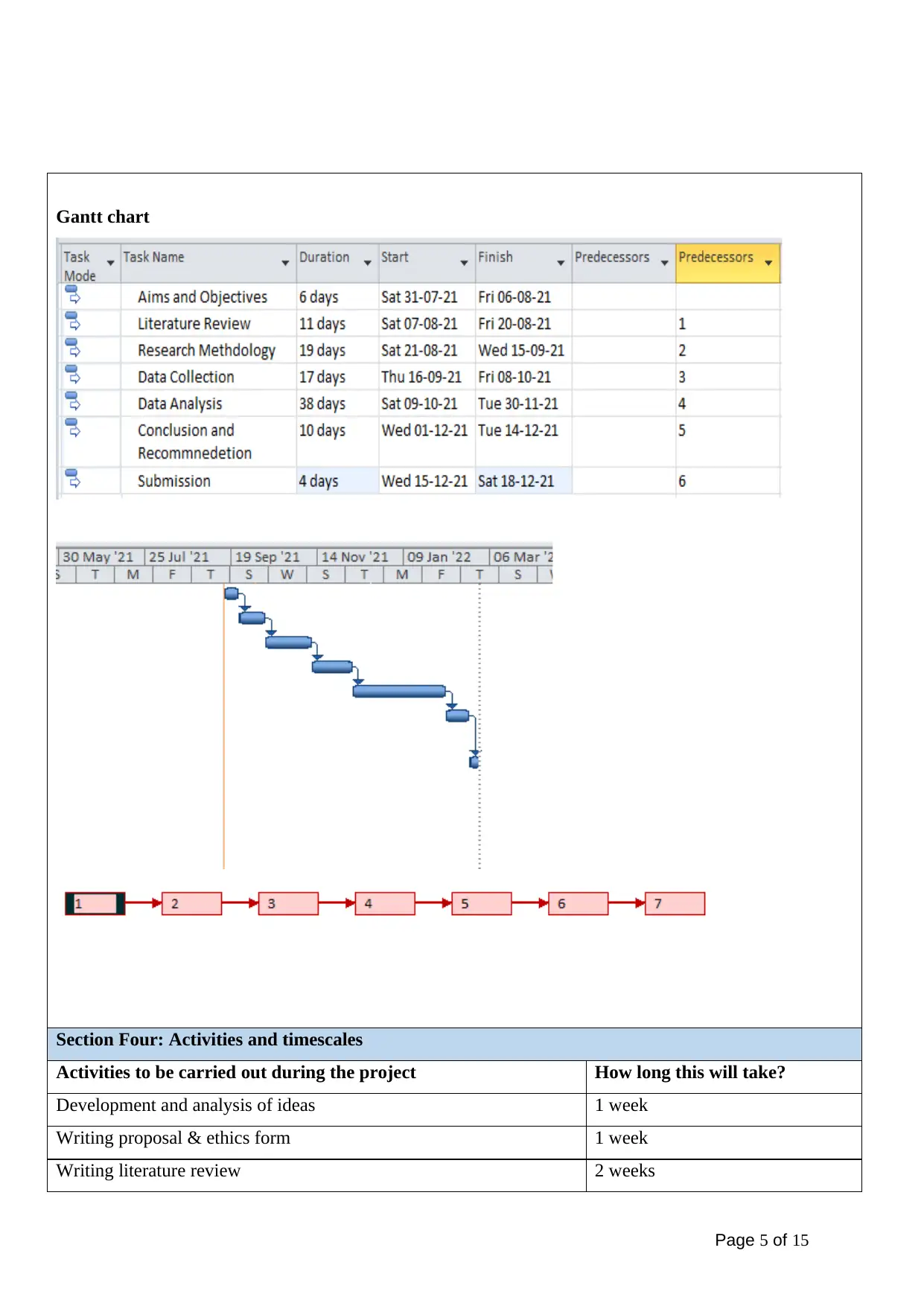
Gantt chart
Section Four: Activities and timescales
Activities to be carried out during the project How long this will take?
Development and analysis of ideas 1 week
Writing proposal & ethics form 1 week
Writing literature review 2 weeks
Page 5 of 15
Section Four: Activities and timescales
Activities to be carried out during the project How long this will take?
Development and analysis of ideas 1 week
Writing proposal & ethics form 1 week
Writing literature review 2 weeks
Page 5 of 15

Writing methodology 1 week
Data collection and analysis 2 weeks
Writing Discussion and conclusion 2 weeks
Milestone one:
Milestone one target date (set by tutor):
Milestone two:
Milestone two target date (set by tutor):
Comments and agreement from tutor
Comments (optional):
I confirm that the project is not work which has been or will be submitted for another qualification and is
appropriate.
Agreed by:
Tutor name: TEACHER NAME Date: XXXX
Page 6 of 15
Data collection and analysis 2 weeks
Writing Discussion and conclusion 2 weeks
Milestone one:
Milestone one target date (set by tutor):
Milestone two:
Milestone two target date (set by tutor):
Comments and agreement from tutor
Comments (optional):
I confirm that the project is not work which has been or will be submitted for another qualification and is
appropriate.
Agreed by:
Tutor name: TEACHER NAME Date: XXXX
Page 6 of 15
⊘ This is a preview!⊘
Do you want full access?
Subscribe today to unlock all pages.

Trusted by 1+ million students worldwide
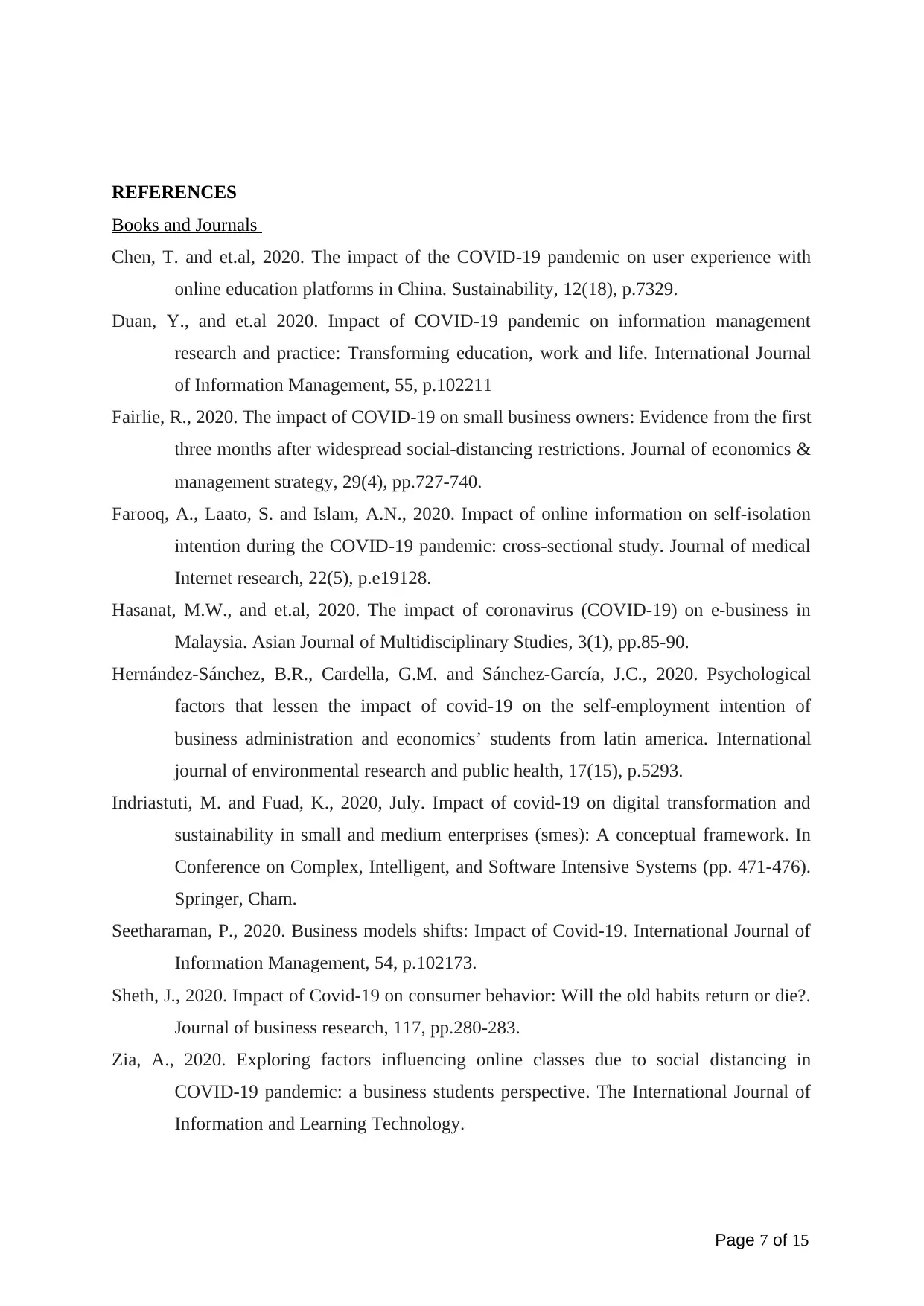
REFERENCES
Books and Journals
Chen, T. and et.al, 2020. The impact of the COVID-19 pandemic on user experience with
online education platforms in China. Sustainability, 12(18), p.7329.
Duan, Y., and et.al 2020. Impact of COVID-19 pandemic on information management
research and practice: Transforming education, work and life. International Journal
of Information Management, 55, p.102211
Fairlie, R., 2020. The impact of COVID‐19 on small business owners: Evidence from the first
three months after widespread social‐distancing restrictions. Journal of economics &
management strategy, 29(4), pp.727-740.
Farooq, A., Laato, S. and Islam, A.N., 2020. Impact of online information on self-isolation
intention during the COVID-19 pandemic: cross-sectional study. Journal of medical
Internet research, 22(5), p.e19128.
Hasanat, M.W., and et.al, 2020. The impact of coronavirus (COVID-19) on e-business in
Malaysia. Asian Journal of Multidisciplinary Studies, 3(1), pp.85-90.
Hernández-Sánchez, B.R., Cardella, G.M. and Sánchez-García, J.C., 2020. Psychological
factors that lessen the impact of covid-19 on the self-employment intention of
business administration and economics’ students from latin america. International
journal of environmental research and public health, 17(15), p.5293.
Indriastuti, M. and Fuad, K., 2020, July. Impact of covid-19 on digital transformation and
sustainability in small and medium enterprises (smes): A conceptual framework. In
Conference on Complex, Intelligent, and Software Intensive Systems (pp. 471-476).
Springer, Cham.
Seetharaman, P., 2020. Business models shifts: Impact of Covid-19. International Journal of
Information Management, 54, p.102173.
Sheth, J., 2020. Impact of Covid-19 on consumer behavior: Will the old habits return or die?.
Journal of business research, 117, pp.280-283.
Zia, A., 2020. Exploring factors influencing online classes due to social distancing in
COVID-19 pandemic: a business students perspective. The International Journal of
Information and Learning Technology.
Page 7 of 15
Books and Journals
Chen, T. and et.al, 2020. The impact of the COVID-19 pandemic on user experience with
online education platforms in China. Sustainability, 12(18), p.7329.
Duan, Y., and et.al 2020. Impact of COVID-19 pandemic on information management
research and practice: Transforming education, work and life. International Journal
of Information Management, 55, p.102211
Fairlie, R., 2020. The impact of COVID‐19 on small business owners: Evidence from the first
three months after widespread social‐distancing restrictions. Journal of economics &
management strategy, 29(4), pp.727-740.
Farooq, A., Laato, S. and Islam, A.N., 2020. Impact of online information on self-isolation
intention during the COVID-19 pandemic: cross-sectional study. Journal of medical
Internet research, 22(5), p.e19128.
Hasanat, M.W., and et.al, 2020. The impact of coronavirus (COVID-19) on e-business in
Malaysia. Asian Journal of Multidisciplinary Studies, 3(1), pp.85-90.
Hernández-Sánchez, B.R., Cardella, G.M. and Sánchez-García, J.C., 2020. Psychological
factors that lessen the impact of covid-19 on the self-employment intention of
business administration and economics’ students from latin america. International
journal of environmental research and public health, 17(15), p.5293.
Indriastuti, M. and Fuad, K., 2020, July. Impact of covid-19 on digital transformation and
sustainability in small and medium enterprises (smes): A conceptual framework. In
Conference on Complex, Intelligent, and Software Intensive Systems (pp. 471-476).
Springer, Cham.
Seetharaman, P., 2020. Business models shifts: Impact of Covid-19. International Journal of
Information Management, 54, p.102173.
Sheth, J., 2020. Impact of Covid-19 on consumer behavior: Will the old habits return or die?.
Journal of business research, 117, pp.280-283.
Zia, A., 2020. Exploring factors influencing online classes due to social distancing in
COVID-19 pandemic: a business students perspective. The International Journal of
Information and Learning Technology.
Page 7 of 15
Paraphrase This Document
Need a fresh take? Get an instant paraphrase of this document with our AI Paraphraser
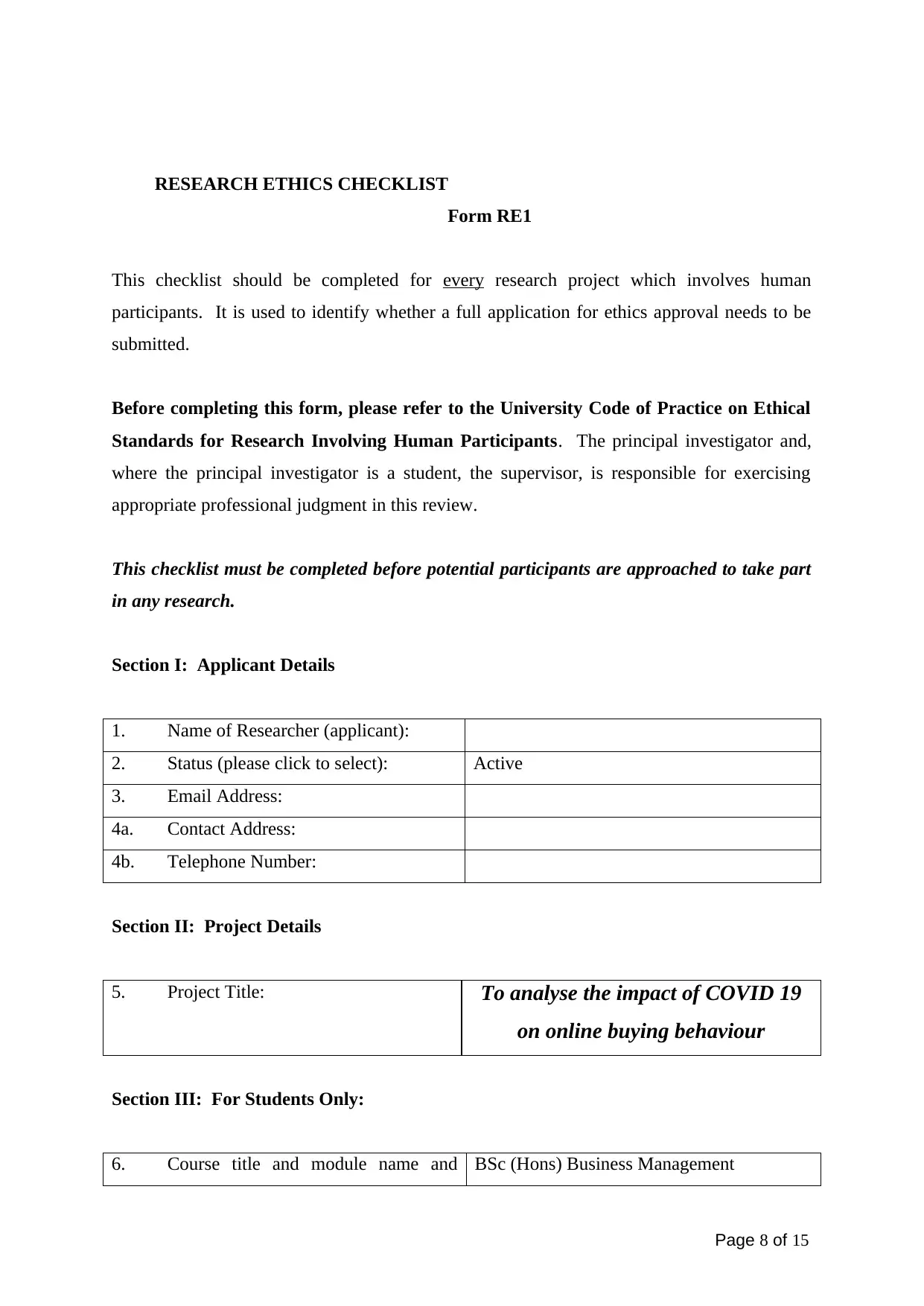
RESEARCH ETHICS CHECKLIST
Form RE1
This checklist should be completed for every research project which involves human
participants. It is used to identify whether a full application for ethics approval needs to be
submitted.
Before completing this form, please refer to the University Code of Practice on Ethical
Standards for Research Involving Human Participants. The principal investigator and,
where the principal investigator is a student, the supervisor, is responsible for exercising
appropriate professional judgment in this review.
This checklist must be completed before potential participants are approached to take part
in any research.
Section I: Applicant Details
1. Name of Researcher (applicant):
2. Status (please click to select): Active
3. Email Address:
4a. Contact Address:
4b. Telephone Number:
Section II: Project Details
5. Project Title: To analyse the impact of COVID 19
on online buying behaviour
Section III: For Students Only:
6. Course title and module name and BSc (Hons) Business Management
Page 8 of 15
Form RE1
This checklist should be completed for every research project which involves human
participants. It is used to identify whether a full application for ethics approval needs to be
submitted.
Before completing this form, please refer to the University Code of Practice on Ethical
Standards for Research Involving Human Participants. The principal investigator and,
where the principal investigator is a student, the supervisor, is responsible for exercising
appropriate professional judgment in this review.
This checklist must be completed before potential participants are approached to take part
in any research.
Section I: Applicant Details
1. Name of Researcher (applicant):
2. Status (please click to select): Active
3. Email Address:
4a. Contact Address:
4b. Telephone Number:
Section II: Project Details
5. Project Title: To analyse the impact of COVID 19
on online buying behaviour
Section III: For Students Only:
6. Course title and module name and BSc (Hons) Business Management
Page 8 of 15
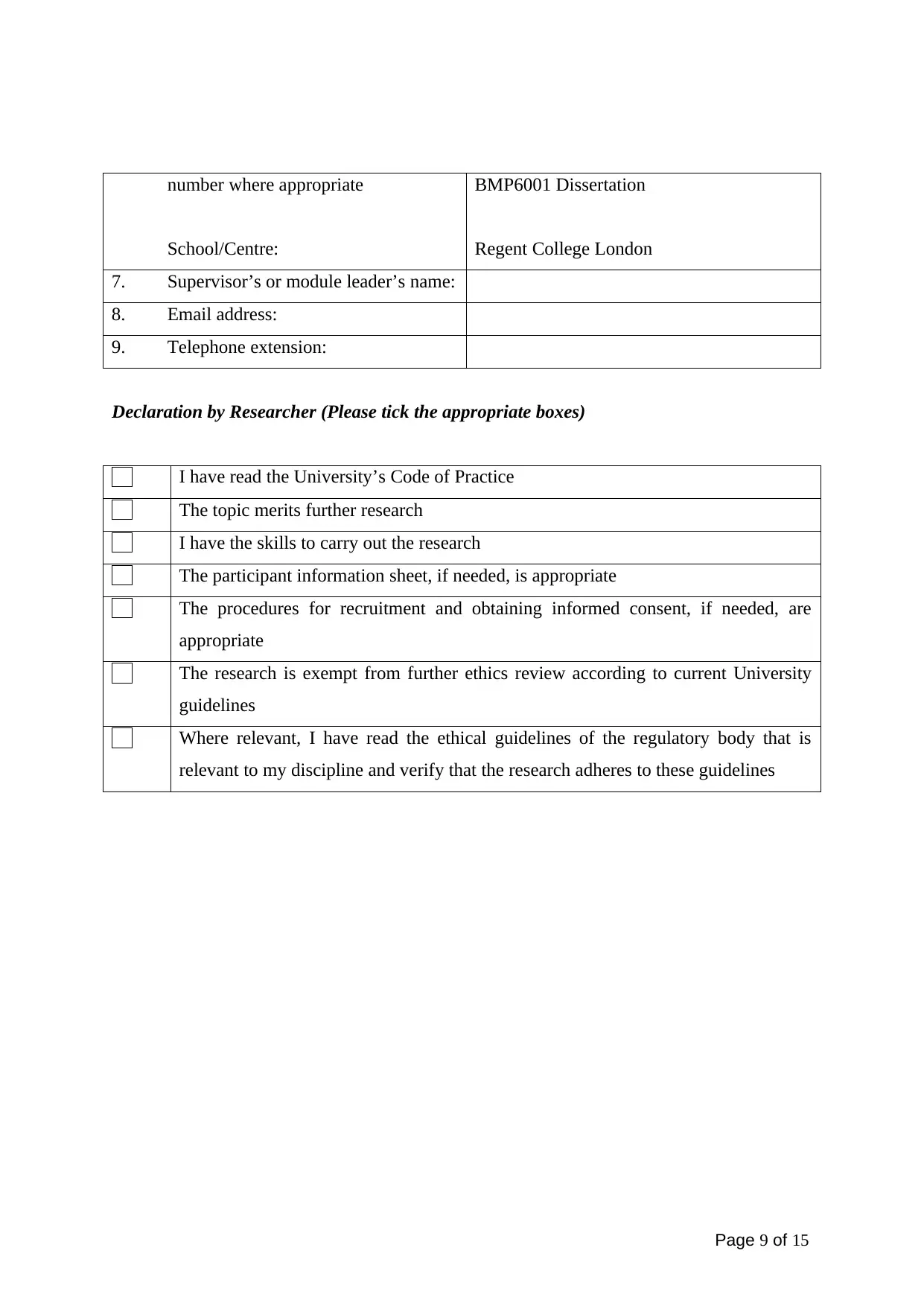
number where appropriate
School/Centre:
BMP6001 Dissertation
Regent College London
7. Supervisor’s or module leader’s name:
8. Email address:
9. Telephone extension:
Declaration by Researcher (Please tick the appropriate boxes)
I have read the University’s Code of Practice
The topic merits further research
I have the skills to carry out the research
The participant information sheet, if needed, is appropriate
The procedures for recruitment and obtaining informed consent, if needed, are
appropriate
The research is exempt from further ethics review according to current University
guidelines
Where relevant, I have read the ethical guidelines of the regulatory body that is
relevant to my discipline and verify that the research adheres to these guidelines
Page 9 of 15
School/Centre:
BMP6001 Dissertation
Regent College London
7. Supervisor’s or module leader’s name:
8. Email address:
9. Telephone extension:
Declaration by Researcher (Please tick the appropriate boxes)
I have read the University’s Code of Practice
The topic merits further research
I have the skills to carry out the research
The participant information sheet, if needed, is appropriate
The procedures for recruitment and obtaining informed consent, if needed, are
appropriate
The research is exempt from further ethics review according to current University
guidelines
Where relevant, I have read the ethical guidelines of the regulatory body that is
relevant to my discipline and verify that the research adheres to these guidelines
Page 9 of 15
⊘ This is a preview!⊘
Do you want full access?
Subscribe today to unlock all pages.

Trusted by 1+ million students worldwide
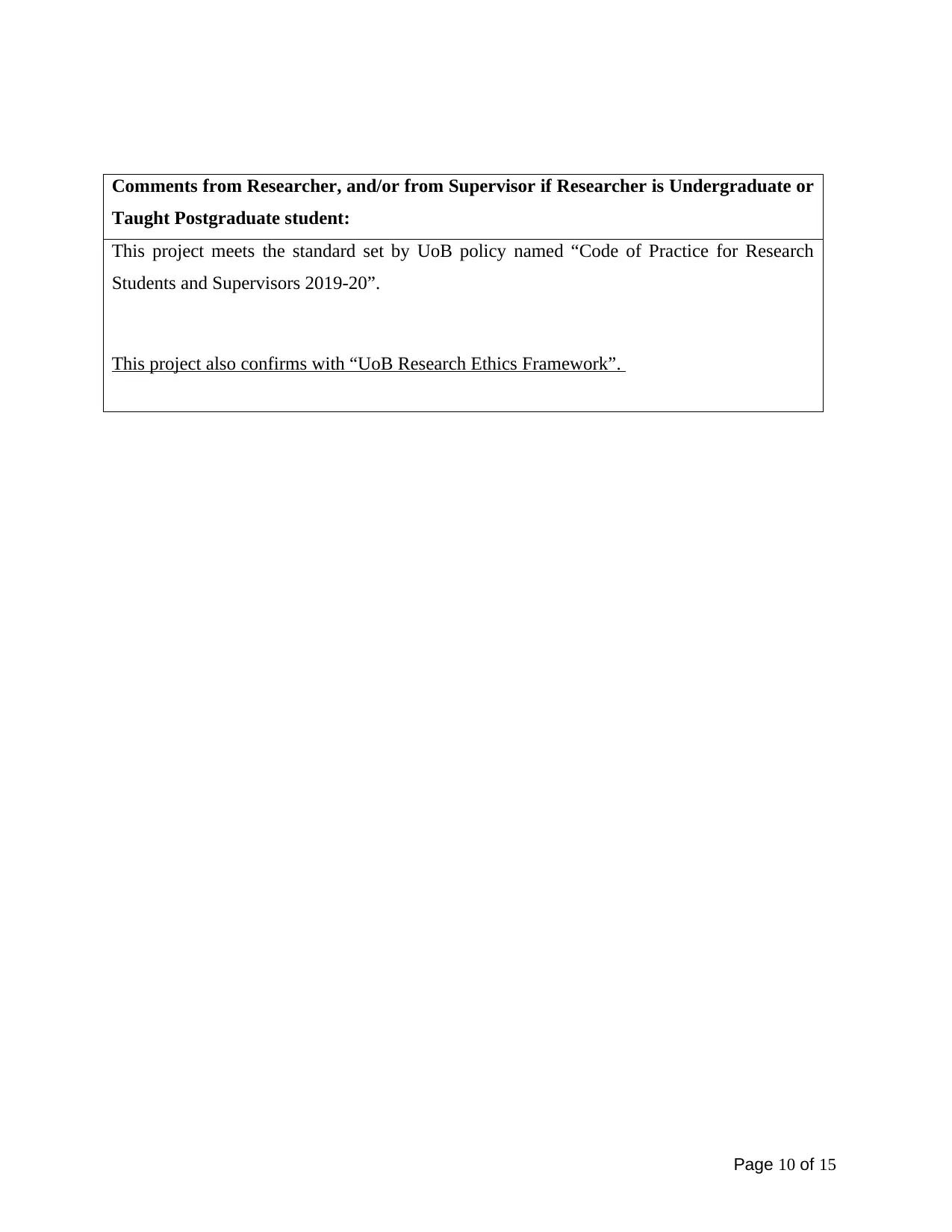
Comments from Researcher, and/or from Supervisor if Researcher is Undergraduate or
Taught Postgraduate student:
This project meets the standard set by UoB policy named “Code of Practice for Research
Students and Supervisors 2019-20”.
This project also confirms with “UoB Research Ethics Framework”.
Page 10 of 15
Taught Postgraduate student:
This project meets the standard set by UoB policy named “Code of Practice for Research
Students and Supervisors 2019-20”.
This project also confirms with “UoB Research Ethics Framework”.
Page 10 of 15
Paraphrase This Document
Need a fresh take? Get an instant paraphrase of this document with our AI Paraphraser
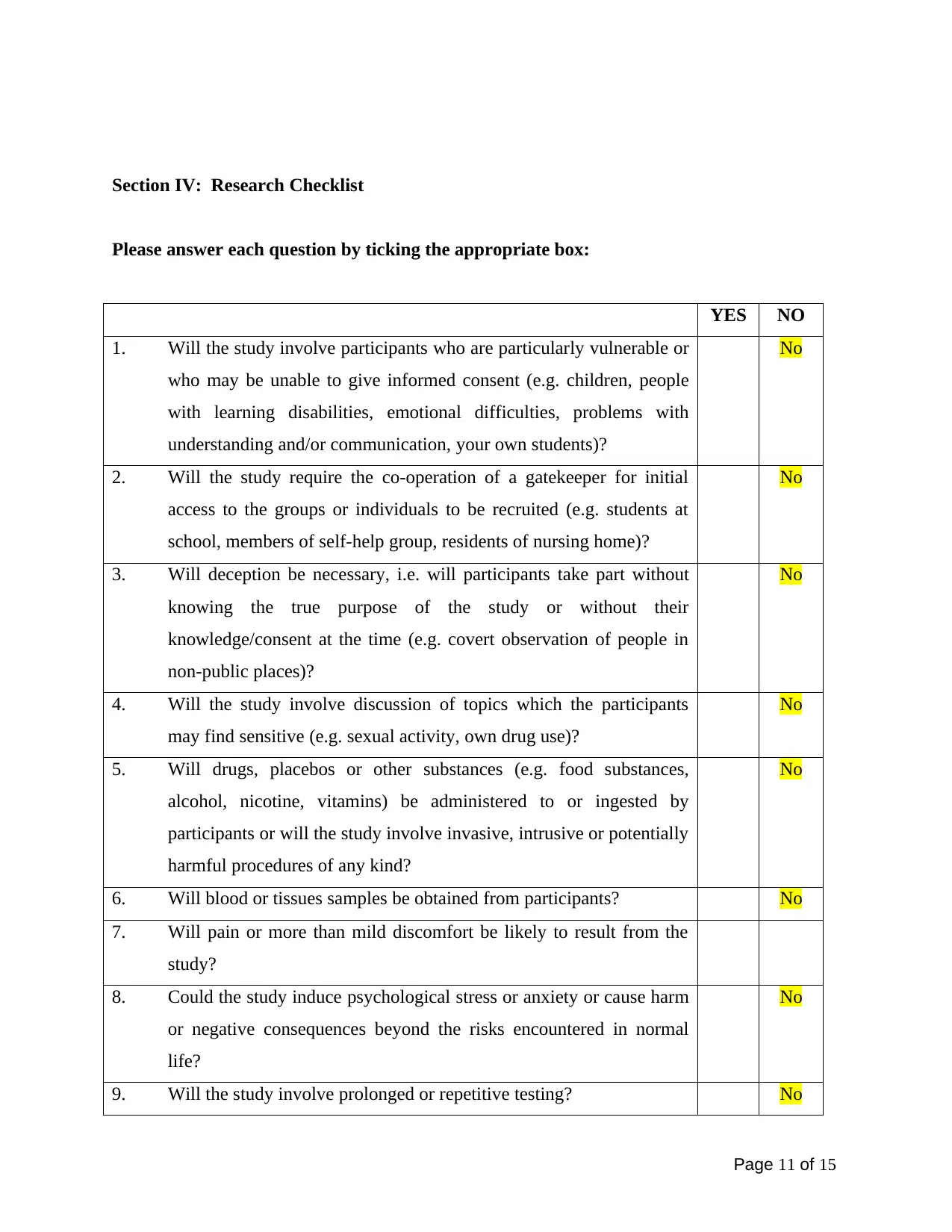
Section IV: Research Checklist
Please answer each question by ticking the appropriate box:
YES NO
1. Will the study involve participants who are particularly vulnerable or
who may be unable to give informed consent (e.g. children, people
with learning disabilities, emotional difficulties, problems with
understanding and/or communication, your own students)?
No
2. Will the study require the co-operation of a gatekeeper for initial
access to the groups or individuals to be recruited (e.g. students at
school, members of self-help group, residents of nursing home)?
No
3. Will deception be necessary, i.e. will participants take part without
knowing the true purpose of the study or without their
knowledge/consent at the time (e.g. covert observation of people in
non-public places)?
No
4. Will the study involve discussion of topics which the participants
may find sensitive (e.g. sexual activity, own drug use)?
No
5. Will drugs, placebos or other substances (e.g. food substances,
alcohol, nicotine, vitamins) be administered to or ingested by
participants or will the study involve invasive, intrusive or potentially
harmful procedures of any kind?
No
6. Will blood or tissues samples be obtained from participants? No
7. Will pain or more than mild discomfort be likely to result from the
study?
8. Could the study induce psychological stress or anxiety or cause harm
or negative consequences beyond the risks encountered in normal
life?
No
9. Will the study involve prolonged or repetitive testing? No
Page 11 of 15
Please answer each question by ticking the appropriate box:
YES NO
1. Will the study involve participants who are particularly vulnerable or
who may be unable to give informed consent (e.g. children, people
with learning disabilities, emotional difficulties, problems with
understanding and/or communication, your own students)?
No
2. Will the study require the co-operation of a gatekeeper for initial
access to the groups or individuals to be recruited (e.g. students at
school, members of self-help group, residents of nursing home)?
No
3. Will deception be necessary, i.e. will participants take part without
knowing the true purpose of the study or without their
knowledge/consent at the time (e.g. covert observation of people in
non-public places)?
No
4. Will the study involve discussion of topics which the participants
may find sensitive (e.g. sexual activity, own drug use)?
No
5. Will drugs, placebos or other substances (e.g. food substances,
alcohol, nicotine, vitamins) be administered to or ingested by
participants or will the study involve invasive, intrusive or potentially
harmful procedures of any kind?
No
6. Will blood or tissues samples be obtained from participants? No
7. Will pain or more than mild discomfort be likely to result from the
study?
8. Could the study induce psychological stress or anxiety or cause harm
or negative consequences beyond the risks encountered in normal
life?
No
9. Will the study involve prolonged or repetitive testing? No
Page 11 of 15
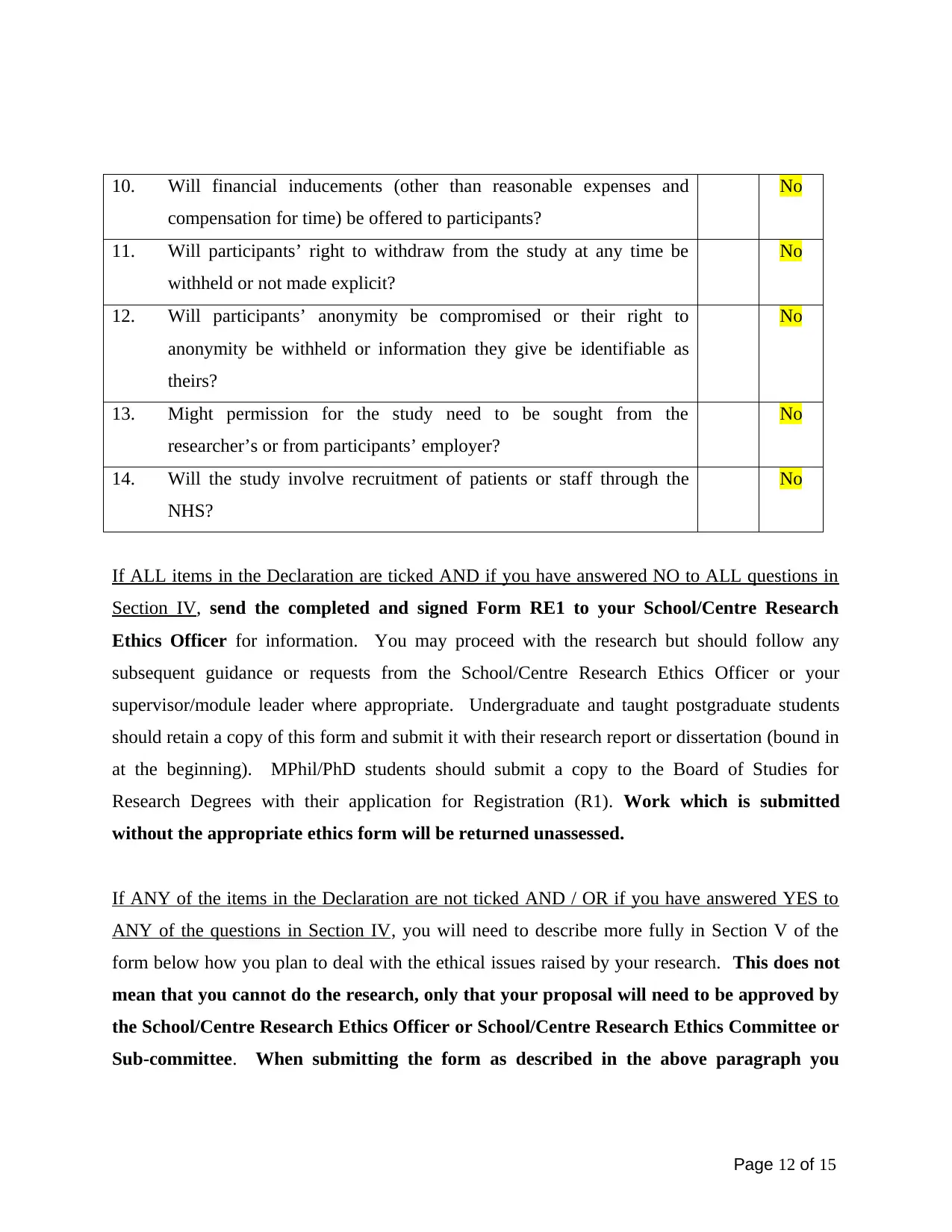
10. Will financial inducements (other than reasonable expenses and
compensation for time) be offered to participants?
No
11. Will participants’ right to withdraw from the study at any time be
withheld or not made explicit?
No
12. Will participants’ anonymity be compromised or their right to
anonymity be withheld or information they give be identifiable as
theirs?
No
13. Might permission for the study need to be sought from the
researcher’s or from participants’ employer?
No
14. Will the study involve recruitment of patients or staff through the
NHS?
No
If ALL items in the Declaration are ticked AND if you have answered NO to ALL questions in
Section IV, send the completed and signed Form RE1 to your School/Centre Research
Ethics Officer for information. You may proceed with the research but should follow any
subsequent guidance or requests from the School/Centre Research Ethics Officer or your
supervisor/module leader where appropriate. Undergraduate and taught postgraduate students
should retain a copy of this form and submit it with their research report or dissertation (bound in
at the beginning). MPhil/PhD students should submit a copy to the Board of Studies for
Research Degrees with their application for Registration (R1). Work which is submitted
without the appropriate ethics form will be returned unassessed.
If ANY of the items in the Declaration are not ticked AND / OR if you have answered YES to
ANY of the questions in Section IV, you will need to describe more fully in Section V of the
form below how you plan to deal with the ethical issues raised by your research. This does not
mean that you cannot do the research, only that your proposal will need to be approved by
the School/Centre Research Ethics Officer or School/Centre Research Ethics Committee or
Sub-committee. When submitting the form as described in the above paragraph you
Page 12 of 15
compensation for time) be offered to participants?
No
11. Will participants’ right to withdraw from the study at any time be
withheld or not made explicit?
No
12. Will participants’ anonymity be compromised or their right to
anonymity be withheld or information they give be identifiable as
theirs?
No
13. Might permission for the study need to be sought from the
researcher’s or from participants’ employer?
No
14. Will the study involve recruitment of patients or staff through the
NHS?
No
If ALL items in the Declaration are ticked AND if you have answered NO to ALL questions in
Section IV, send the completed and signed Form RE1 to your School/Centre Research
Ethics Officer for information. You may proceed with the research but should follow any
subsequent guidance or requests from the School/Centre Research Ethics Officer or your
supervisor/module leader where appropriate. Undergraduate and taught postgraduate students
should retain a copy of this form and submit it with their research report or dissertation (bound in
at the beginning). MPhil/PhD students should submit a copy to the Board of Studies for
Research Degrees with their application for Registration (R1). Work which is submitted
without the appropriate ethics form will be returned unassessed.
If ANY of the items in the Declaration are not ticked AND / OR if you have answered YES to
ANY of the questions in Section IV, you will need to describe more fully in Section V of the
form below how you plan to deal with the ethical issues raised by your research. This does not
mean that you cannot do the research, only that your proposal will need to be approved by
the School/Centre Research Ethics Officer or School/Centre Research Ethics Committee or
Sub-committee. When submitting the form as described in the above paragraph you
Page 12 of 15
⊘ This is a preview!⊘
Do you want full access?
Subscribe today to unlock all pages.

Trusted by 1+ million students worldwide
1 out of 15
Related Documents
Your All-in-One AI-Powered Toolkit for Academic Success.
+13062052269
info@desklib.com
Available 24*7 on WhatsApp / Email
![[object Object]](/_next/static/media/star-bottom.7253800d.svg)
Unlock your academic potential
Copyright © 2020–2026 A2Z Services. All Rights Reserved. Developed and managed by ZUCOL.





